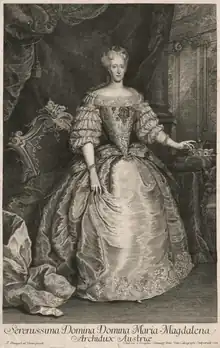Archduchess Maria Magdalena of Austria (1689–1743)
Maria Magdalena, Archduchess of Austria (Maria Magdalena Josefa; 26 March 1689 – 1 May 1743) was a governor of Tyrol[1] and daughter of Emperor Leopold I and his third wife Eleonore Magdalene of the Palatinate. She died unmarried.
| Archduchess Maria Magdalena | |
|---|---|
| Archduchess of Austria | |
 | |
| Born | 26 March 1689 Hofburg Palace, Vienna, Archduchy of Austria, Holy Roman Empire |
| Died | 1 May 1743 (aged 54) Hofburg Palace, Vienna, Archduchy of Austria, Holy Roman Empire |
| Burial | Imperial Crypt, Vienna |
| House | Habsburg |
| Father | Leopold I, Holy Roman Emperor |
| Mother | Eleonore Magdalene of the Palatinate |
Biography
Born at the Hofburg Palace in Vienna she was the ninth child of Emperor Leopold I and Eleonore Magdalene of the Palatinate. Shortly before the War of the Spanish Succession, there was the question of the new king of Spain, Philip V of Spain, marrying the archduchess, but Louis XIV of France was opposed to this match for political reasons, and the official reason given was that none of the archduchesses offered pleased his grandson. In 1708, her older sister Archduchess Maria Anna married John V of Portugal; plans for a second union between Austria and Portugal were discussed when Maria Magdalena was proposed as a bride for Infante Francis, Duke of Beja, brother of John V. Negotiations failed in the early stages and, as such, both candidates died unmarried. Again after the war the question of her becoming queen of Spain to replace the now deceased Luisa Maria of Savoy was floated. However, again it came to naught and Philip married Elisabeth Farnese instead.
After the failed marriage, she lived a life of seclusion and remained unmarried and died without issue. She had a close relationship to her niece Maria Theresa, the daughter of her brother Emperor Charles VI and future Empress and also with her sister Archduchess Maria Anna. She died of pneumonia at the age of 54. She was buried at the Imperial Crypts in Vienna.
Ancestors
References
- Kapuzinergruft. "Erzherzogin Maria Magdalena: Kapuzinergruft - Wien" (in German). Retrieved 2022-11-08.
- Eder, Karl (1961), "Ferdinand II.", Neue Deutsche Biographie (in German), vol. 5, Berlin: Duncker & Humblot, pp. 83–85; (full text online)
- Eder, Karl (1961), "Ferdinand III.", Neue Deutsche Biographie (in German), vol. 5, Berlin: Duncker & Humblot, pp. 85–86; (full text online)
- Genealogie ascendante jusqu'au quatrieme degre inclusivement de tous les Rois et Princes de maisons souveraines de l'Europe actuellement vivans [Genealogy up to the fourth degree inclusive of all the Kings and Princes of sovereign houses of Europe currently living] (in French). Bourdeaux: Frederic Guillaume Birnstiel. 1768. p. 100.
- Wurzbach, Constantin, von, ed. (1861). . Biographisches Lexikon des Kaiserthums Oesterreich [Biographical Encyclopedia of the Austrian Empire] (in German). Vol. 7. p. 23 – via Wikisource.
{{citation}}: CS1 maint: multiple names: editors list (link) - Wurzbach, Constantin, von, ed. (1861). . Biographisches Lexikon des Kaiserthums Oesterreich [Biographical Encyclopedia of the Austrian Empire] (in German). Vol. 7. p. 120 – via Wikisource.
{{citation}}: CS1 maint: multiple names: editors list (link) - Wurzbach, Constantin, von, ed. (1861). . Biographisches Lexikon des Kaiserthums Oesterreich [Biographical Encyclopedia of the Austrian Empire] (in German). Vol. 7. p. 23 – via Wikisource.
{{citation}}: CS1 maint: multiple names: editors list (link) - Wurzbach, Constantin, von, ed. (1861). . Biographisches Lexikon des Kaiserthums Oesterreich [Biographical Encyclopedia of the Austrian Empire] (in German). Vol. 7. p. 13 – via Wikisource.
{{citation}}: CS1 maint: multiple names: editors list (link) - Breitenbach, Josef (1898), "Wolfgang Wilhelm", Allgemeine Deutsche Biographie (ADB) (in German), vol. 44, Leipzig: Duncker & Humblot, pp. 87–116
- Fuchs, Peter (2001), "Philipp Wilhelm", Neue Deutsche Biographie (in German), vol. 20, Berlin: Duncker & Humblot, p. 384; (full text online)
- Wolf, Joseph Heinrich (1844). Das Haus Wittelsbach. Bayern's Geschichte (in German). p. 281.
- Becker, Wilhelm Martin (1964), "Georg II.", Neue Deutsche Biographie (in German), vol. 6, Berlin: Duncker & Humblot, p. 217; (full text online)
- Louda, Jirí; MacLagan, Michael (1999). Lines of Succession: Heraldry of the Royal Families of Europe (2nd ed.). London: Little, Brown and Company. table 84.
- Flathe, Heinrich Theodor (1881), "Johann Georg I. (Kurfürst von Sachsen)", Allgemeine Deutsche Biographie (ADB) (in German), vol. 14, Leipzig: Duncker & Humblot, pp. 376–381